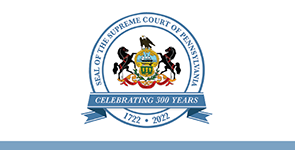News
Pennsylvania Supreme Court Releases New Booklet to Honor 300th Anniversary

May 18, 2022
– In honor of its 300 anniversary, the Supreme Court of Pennsylvania has released a new historical booklet taking readers through an illustrated history of the Court.
The booklet offers a detailed timeline of the Court, including Pennsylvania’s early attempts at a judiciary, and explains the different powers the Court has derived from the Pennsylvania Constitutions and how those powers have evolved over time.
Encompassing some of the Court’s most significant decisions and actions throughout its history on topics such as constitutional law and civil rights, slavery and the state, labor law etc., the booklet also provides interesting background about the renowned artwork and different locations of the Court’s three historic courtrooms.
“It is our hope that this newest resource, supplementing other recently-developed educational material about the Court, will allow members of the public – including students and teachers – to not only recognize and celebrate this historic milestone with us, but understand how the work and role of the Court intersects with significant moments of our state’s history and paves the way for the future,” said Chief Justice Max Baer.
The Court gratefully acknowledges the contributions of those involved in the booklet’s development, who notably include Mark Frazier Lloyd, Philadelphia archivist and historian; Julie Randolph, Director of Outreach and Information at Temple University Beasley School of Law; Dr. Joel Fishman of Duquesne University School of Law; and artist Keith Ragone of Keith Ragone Studio, Inc.
The Pennsylvania Supreme Court is the Commonwealth’s highest court and the oldest appellate court in the nation. The Judiciary Act of 1722 created the Supreme Court as a permanent body with authority over both appeals and trials, although its roots go back to the provincial court established in 1684. The Court has full administrative authority over all aspects of Pennsylvania’s judicial system and may also hear cases involving issues of immediate public importance that arise in the Commonwealth. The commemoration will highlight the Court’s unique role and how its decisions affect every Pennsylvanian.
Information about the history of the Court and upcoming commemorative events celebrating the 300th anniversary of the Court is available here and will be shared via Facebook @PennsylvaniaCourts and Twitter @PACourts.
###
Media contact: Casey Scheffler, 610-425-1712
